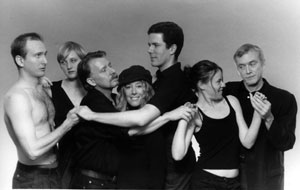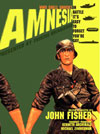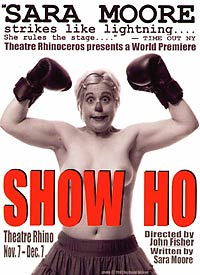Theatre Rhinoceros treasures at Bancroft
 BERKELEY – The University of California, Berkeley's Bancroft Library is processing an eclectic assortment of materials documenting a quarter-century of San Francisco's hugely successful Theatre Rhinoceros - said to be the world's longest running lesbian, gay, bisexual and transgender theater company.
BERKELEY – The University of California, Berkeley's Bancroft Library is processing an eclectic assortment of materials documenting a quarter-century of San Francisco's hugely successful Theatre Rhinoceros - said to be the world's longest running lesbian, gay, bisexual and transgender theater company.
The archival material includes original scripts, reviews, videos, tapes of sound cues and programs. There also are two model stage settings, actors' publicity shots for casting calls, files of plays rejected with accompanying evaluation sheets and even board meeting minutes. The topper is a platinum beehive wig from the 2002 play, "Hairstory," that is festooned with electric lights.
  The cast of “Amnesia,” whose
main character awakes in an Army hospital during World
War II, unable to remember his
name, his background … or the fact
that he’s
gay. The play takes him across Europe, fleeing the Nazis
and being rescued from a lobotomy by a has-been
Hollywood actress. (Courtesy
Bancroft Library)
The cast of “Amnesia,” whose
main character awakes in an Army hospital during World
War II, unable to remember his
name, his background … or the fact
that he’s
gay. The play takes him across Europe, fleeing the Nazis
and being rescued from a lobotomy by a has-been
Hollywood actress. (Courtesy
Bancroft Library) |
"Much more than many theater groups, this reflects the history of the gay community," said William Benemann, head of technical services for UC Berkeley's Boalt Hall (School of Law) Library and a consultant with Theatre Rhinoceros about the archives. "Look at the themes that were produced in the plays. They exactly match what was important to the community at that particular time."
Doug Holsclaw, artistic director of Theatre Rhinoceros since 1999, said that during "a time of great fear and uncertainty, Rhinoceros took a strong stand in realistically discussing safe sex, family issues, grief and sexual expression."
The Bancroft Library and the UC Berkeley campus are "intensely interested in documenting theater throughout the San Francisco Bay area," said Anthony Bliss, the library's curator of rare books and manuscripts. "And this is an important part of that."
The Theatre Rhinoceros archive will be a "gold mine for gay and lesbian theater researchers," said John Fisher, the theater's artistic director and a visiting faculty member at UC Berkeley's English department. He said he hopes a graduate student will write a history and analysis of the theater, based on the primary source material now at the Bancroft.
 Sara Moore, a former circus clown and performance artist, was the one-woman cast of “Show Ho” in 2002. (Courtesy Bancroft Library) |
"My only regret is it wasn't there when I wrote my dissertation (on camp theater)," said Fisher, who earned a BA, MA and PhD in dramatic art and a BA in history - all at UC Berkeley,
Establishing this archive at the Bancroft is important for several reasons, said Benemann.
"For one thing," he said, "it's a wonderful document of culture in the Bay Area, in general. It's very unusual for any small theater group to be able to subsist for 25 years with its performance being almost always unknown plays and unknown playwrights, and not depending on Hollywood stars to lure the audience.
"You have a community that really supports the concept of the theater. There are very few places in America that have that kind of tradition."
The often-campy posters of performances offer a glimpse of the region's evolving graphic arts scene, too, Benemann said.
The archive also plays a role in documenting the history of the Bay Area's gay community, he said.
The non-profit theater founded by New York writer Allan Estes had its first success with a production in a South of Market leather bar, The Black and Blue, of Doric Wilson's "The West Street Gang," which spoofed everyone from New York City police to Anita Bryant.
From there, Theatre Rhinoceros moved to a community center on Grove Street, then to a storefront home on Geary Boulevard, where it produced works by other New York writers such as Robert Patrick, Terrence McNally and Harvey Fierstein, with his (Fierstein's) pre-Broadway one-act plays that eventually became "Torch Song Trilogy." Other names gracing the theater's marquee include Paula Vogel, before she won a Pulitzer Prize, Cherrie Moraga, Lea DeLaria, Jane Chambers and Guillermo Reyes.
In 1981, the theater found new space in the Mission District, where it remains today.
It was also during the '80s that Estes died from AIDS and the theater premiered "Artists Involved With Death and Survival: The AIDS Show." This show, authored by 20 different Bay Area artists, ran for two years and toured jails, schools and churches across the country. It became the focus of a PBS documentary of the same name. Holsclaw was the play's co-director.
"The AIDS Show was actually very upbeat, and inspirational," recalled Benemann.
A complete collection of board minutes "also tell the story of a rambunctious and free-spirited organization struggling with financial realities, fundraising, gender politics, and the rough and tumble world of the gay press," Holslaw said. "Many articles and reviews are featured from gay publications long since out of print."
The archive also is a repository of the work of dozens of artists, photographers, graphic artists and designers "who died prematurely," said Holsclaw.
Transcripts of oral histories of people involved with Theatre Rhinoceros also will be part of the archive. Holsclaw, who has received a grant for the San Francisco Arts Commission to write a book on gay theater, is conducting the interviews.
"In so many ways, the Rhino collection mirrors, and tells the story of, the emerging gay community that was born in the '70s and continues now with new issues of assimilation, military, parenting and legal issues - all of which has been reflected in the work on our stage," said Holsclaw.
The theater will continue to turn over its archival materials to The Bancroft Library indefinitely.

